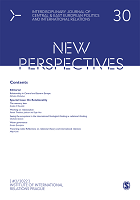Three central triggers for the emergence of Central and Eastern European anti-gender alliances
Three central triggers for the emergence of Central and Eastern European anti-gender alliances
Author(s): Katalin FábiánSubject(s): Gender Studies, Civil Society, Politics and society
Published by: SAGE Publications Ltd
Keywords: Gender; democratisation; authoritarian; Hungary; Poland; Russia; Central and Eastern Europe;
Summary/Abstract: The anti-gender movements began in the West but have thus far been most influential and governmentally supported in Hungary, Poland and Russia. Anti-genderism has served multiple functions to entrench what proponents label as traditional values, while promoting specific class and racialised interests in the cloak of rejecting both the communist past and Western European political and social expectations. Why did anti-genderism develop and become pronounced in otherwise different post-communist countries? This article traces the origins of these movements based on news coverage and scholarly sources, arguing that anti-gender movements signal authoritarian trends and thus matter deeply for open, democratic societies. The Hungarian, Polish and Russian cases offer similar but distinct variations in the political trajectory of their respective movements, highlighting the feedback between conservative, expressively patriarchal, and populist forces and their embracing of anti-genderism.
- Issue Year: 30/2022
- Issue No: 3
- Page Range: 293-310
- Page Count: 18
- Language: English
- Content File-PDF

